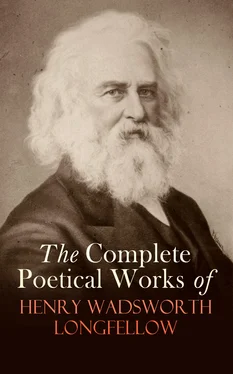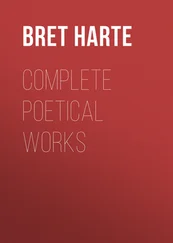Hyp. But in truth
Thou wilt not marry her.
Vict. In truth I will.
The angels sang in heaven when she was born!
She is a precious jewel I have found
Among the filth and rubbish of the world.
I'll stoop for it; but when I wear it here,
Set on my forehead like the morning star,
The world may wonder, but it will not laugh.
Hyp. If thou wear'st nothing else upon thy forehead,
'T will be indeed a wonder.
Vict. Out upon thee
With thy unseasonable jests! Pray tell me,
Is there no virtue in the world?
Hyp. Not much.
What, think'st thou, is she doing at this moment;
Now, while we speak of her?
Vict. She lies asleep,
And from her parted lips her gentle breath
Comes like the fragrance from the lips of flowers.
Her tender limbs are still, and on her breast
The cross she prayed to, ere she fell asleep,
Rises and falls with the soft tide of dreams,
Like a light barge safe moored.
Hyp. Which means, in prose,
She's sleeping with her mouth a little open!
Vict. O, would I had the old magician's glass
To see her as she lies in childlike sleep!
Hyp. And wouldst thou venture?
Vict. Ay, indeed I would!
Hyp. Thou art courageous. Hast thou e'er reflected
How much lies hidden in that one word, NOW?
Vict. Yes; all the awful mystery of Life!
I oft have thought, my dear Hypolito,
That could we, by some spell of magic, change
The world and its inhabitants to stone,
In the same attitudes they now are in,
What fearful glances downward might we cast
Into the hollow chasms of human life!
What groups should we behold about the death-bed,
Putting to shame the group of Niobe!
What joyful welcomes, and what sad farewells!
What stony tears in those congealed eyes!
What visible joy or anguish in those cheeks!
What bridal pomps, and what funereal shows!
What foes, like gladiators, fierce and struggling!
What lovers with their marble lips together!
Hyp. Ay, there it is! and, if I were in love,
That is the very point I most should dread.
This magic glass, these magic spells of thine,
Might tell a tale were better left untold.
For instance, they might show us thy fair cousin,
The Lady Violante, bathed in tears
Of love and anger, like the maid of Colchis,
Whom thou, another faithless Argonaut,
Having won that golden fleece, a woman's love,
Desertest for this Glauce.
Vict. Hold thy peace!
She cares not for me. She may wed another,
Or go into a convent, and, thus dying,
Marry Achilles in the Elysian Fields.
Hyp. (rising). And so, good night! Good morning, I should say.
(Clock strikes three.)
Hark! how the loud and ponderous mace of Time
Knocks at the golden portals of the day!
And so, once more, good night! We'll speak more largely
Of Preciosa when we meet again.
Get thee to bed, and the magician, Sleep,
Shall show her to thee, in his magic glass,
In all her loveliness. Good night!
[Exit.
Vict. Good night!
But not to bed; for I must read awhile.
(Throws himself into the arm-chair which HYPOLITO has left, and lays a large book open upon his knees.)
Must read, or sit in revery and watch The changing color of the waves that break Upon the idle sea-shore of the mind! Visions of Fame! that once did visit me, Making night glorious with your smile, where are ye? O, who shall give me, now that ye are gone, Juices of those immortal plants that bloom Upon Olympus, making us immortal? Or teach me where that wondrous mandrake grows Whose magic root, torn from the earth with groans, At midnight hour, can scare the fiends away, And make the mind prolific in its fancies! I have the wish, but want the will, to act! Souls of great men departed! Ye whose words Have come to light from the swift river of Time, Like Roman swords found in the Tagus' bed, Where is the strength to wield the arms ye bore? From the barred visor of Antiquity Reflected shines the eternal light of Truth, As from a mirror! All the means of action—The shapeless masses, the materials—Lie everywhere about us. What we need Is the celestial fire to change the flint Into transparent crystal, bright and clear. That fire is genius! The rude peasant sits At evening in his smoky cot, and draws With charcoal uncouth figures on the wall. The son of genius comes, foot-sore with travel, And begs a shelter from the inclement night. He takes the charcoal from the peasant's hand, And, by the magic of his touch at once Transfigured, all its hidden virtues shine, And, in the eyes of the astonished clown, It gleams a diamond! Even thus transformed, Rude popular traditions and old tales Shine as immortal poems, at the touch Of some poor, houseless, homeless, wandering bard, Who had but a night's lodging for his pains. But there are brighter dreams than those of Fame, Which are the dreams of Love! Out of the heart Rises the bright ideal of these dreams, As from some woodland fount a spirit rises And sinks again into its silent deeps, Ere the enamored knight can touch her robe! 'T is this ideal that the soul of man, Like the enamored knight beside the fountain, Waits for upon the margin of Life's stream; Waits to behold her rise from the dark waters, Clad in a mortal shape! Alas! how many Must wait in vain! The stream flows evermore, But from its silent deeps no spirit rises! Yet I, born under a propitious star, Have found the bright ideal of my dreams. Yes! she is ever with me. I can feel, Here, as I sit at midnight and alone, Her gentle breathing! on my breast can feel The pressure of her head! God's benison Rest ever on it! Close those beauteous eyes, Sweet Sleep! and all the flowers that bloom at night With balmy lips breathe in her ears my name!
(Gradually sinks asleep.)
Table of Contents
SCENE I. — PRECIOSA'S chamber. Morning. PRECIOSA and ANGELICA.
Table of Contents
Prec. Why will you go so soon? Stay yet awhile.
The poor too often turn away unheard
From hearts that shut against them with a sound
That will be heard in heaven. Pray, tell me more
Of your adversities. Keep nothing from me.
What is your landlord's name?
Ang. The Count of Lara.
Prec. The Count of Lara? O, beware that man!
Mistrust his pity—hold no parley with him!
And rather die an outcast in the streets
Than touch his gold.
Ang. You know him, then!
Prec. As much
As any woman may, and yet be pure.
As you would keep your name without a blemish,
Beware of him!
Ang. Alas! what can I do?
I cannot choose my friends. Each word of kindness,
Come whence it may, is welcome to the poor.
Prec. Make me your friend. A girl so young and fair
Should have no friends but those of her own sex.
What is your name?
Ang. Angelica.
Prec. That name
Was given you, that you might be an angel
To her who bore you! When your infant smile
Made her home Paradise, you were her angel.
O, be an angel still! She needs that smile.
So long as you are innocent, fear nothing.
No one can harm you! I am a poor girl,
Whom chance has taken from the public streets.
I have no other shield than mine own virtue.
That is the charm which has protected me!
Amid a thousand perils, I have worn it
Here on my heart! It is my guardian angel.
Ang. (rising). I thank you for this counsel, dearest lady.
Prec. Thank me by following it.
Ang. Indeed I will.
Prec. Pray, do not go. I have much more to say.
Ang. My mother is alone. I dare not leave her.
Prec. Some other time, then, when we meet again.
Читать дальше












